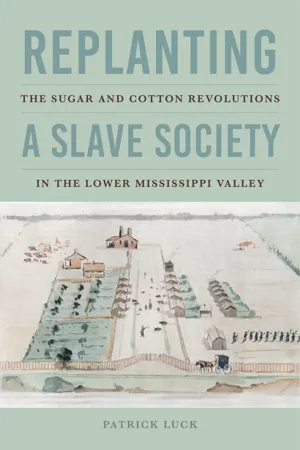
Replanting a Slave Society
The Sugar and Cotton Revolutions in the Lower Mississippi Valley
- 240 pages
- English
- ePUB (mobile friendly)
- Available on iOS & Android
Replanting a Slave Society
The Sugar and Cotton Revolutions in the Lower Mississippi Valley
About this book
Although it eventually became a regrettably profitable business for enslavers and their partners, a successful slave economy in the American South was no foregone conclusion. Bringing the lower Mississippi valley to the foreground of the history of the early republic, Replanting a Slave Society is the first major study to analyze in tandem the sugar and cotton revolutions that took place in the region in the years before and after the Louisiana Purchase in 1803. It highlights the far-ranging, at times nation-encompassing, consequences of decisions made by a small elite group of planters and merchants in a remote colonial slave society and their effect on the subsequent course of American history.
In the mid-1790s, the power and prosperity of the lower Mississippi valley's colonial elites came under threat from revolutionary instability and economic collapse. In response, those elites engaged in a successful effort to remake their society by rapidly adopting sugar and cotton production, adapting them to local conditions, taking advantage of, and advancing, the existing slave trades, and reshaping those slave trades to suit their needs. In 1811, following the successful suppression of the German Coast Insurrection (the largest slave revolt in North American history), these planter elites congratulated themselves on the stability and future prosperity of their "replanted" slave society. These crop revolutions marked a key turning point in the history of the lower Mississippi valley and set the economic and social course that the region—the hub of the Deep South—would follow until the American Civil War.
Frequently asked questions
- Essential is ideal for learners and professionals who enjoy exploring a wide range of subjects. Access the Essential Library with 800,000+ trusted titles and best-sellers across business, personal growth, and the humanities. Includes unlimited reading time and Standard Read Aloud voice.
- Complete: Perfect for advanced learners and researchers needing full, unrestricted access. Unlock 1.4M+ books across hundreds of subjects, including academic and specialized titles. The Complete Plan also includes advanced features like Premium Read Aloud and Research Assistant.
Please note we cannot support devices running on iOS 13 and Android 7 or earlier. Learn more about using the app.
Information
Table of contents
- Cover
- Title Page
- Copyright Page
- Dedication
- Contents
- List of Illustrations
- Acknowledgments
- Introduction
- 1 The Crisis of the 1790s
- 2 Making the Cotton Revolution
- 3 Making the Sugar Revolution
- 4 Remaking the Slave Trades
- 5 Enslavers Triumphant
- Conclusion
- Appendix: Using Gwendolyn Midlo Hall’s Louisiana Slave Database
- Notes
- Bibliography
- Index